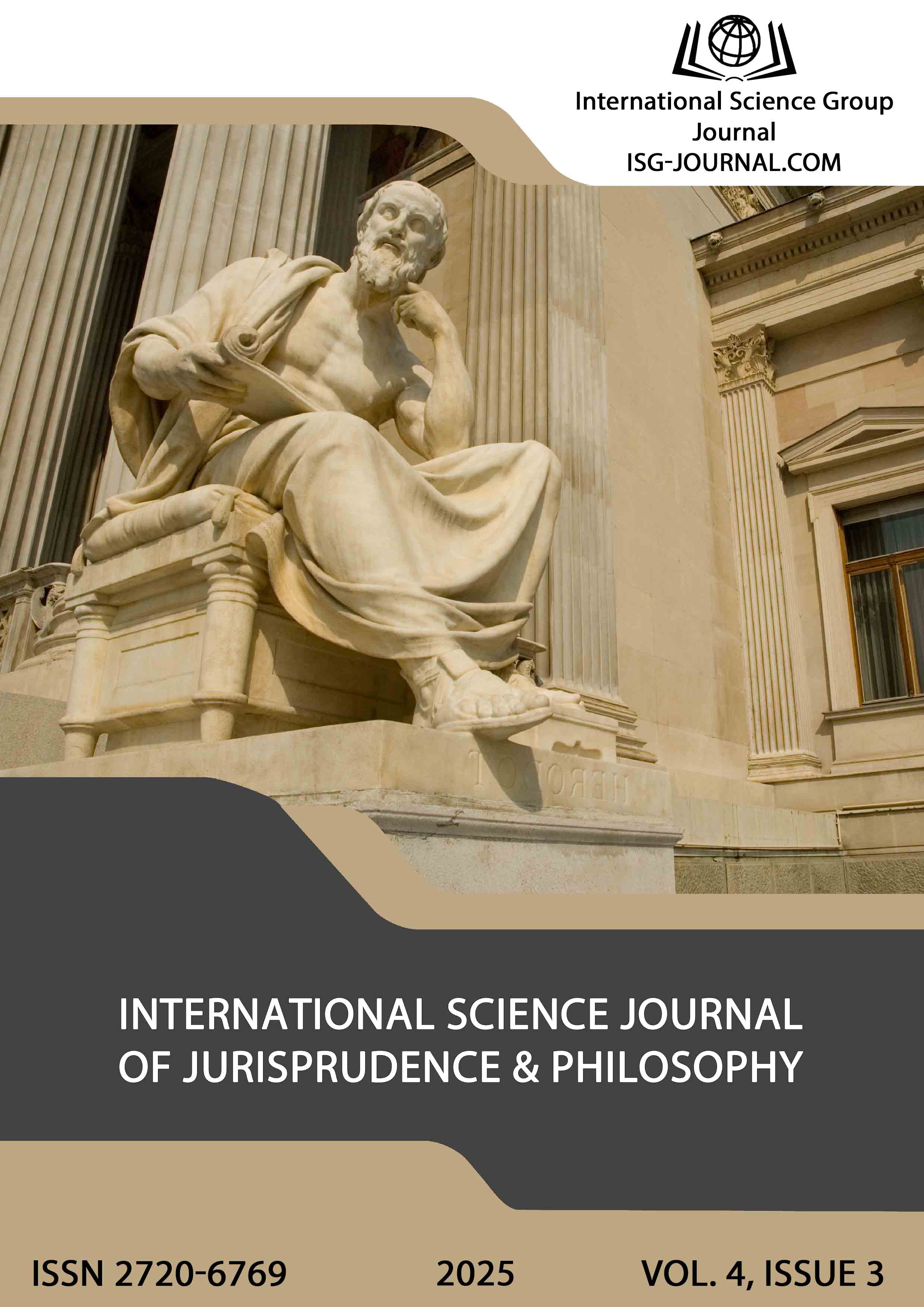Artificial intelligence and its place in legal science
DOI:
https://doi.org/10.46299/j.isjjp.20250403.03Keywords:
artificial intelligence, algorithms, legal sphere, information processing, automationAbstract
The article analyzes the impact of artificial intelligence on the legal sphere, analyzing its potential, benefits, and challenges. The article emphasizes the synergy between artificial intelligence and lawyers, where technology acts as an assistant rather than a substitute for human judgment, creativity, and empathy. The relevance of the topic is due to the rapid development of artificial intelligence technologies, which are penetrating deeper and deeper into the legal sphere, affecting the efficiency of lawyers, ethical standards and principles of justice. The author examines how artificial intelligence, defined as an intelligent system capable of self-learning and autonomous problem solving, can optimize routine processes such as document preparation, legal research, and precedent analysis, while creating new challenges for the legal system. This paper explores the potential of artificial intelligence to increase the efficiency of lawyers by automating routine tasks such as classifying offenses, analyzing court precedents, and predicting decisions based on big data. At the same time, the author draws attention to the limitations of this technology, including bias arising from biased training data, the possibility of generating false information, privacy issues, and ethical challenges. The legal aspects of liability for damage caused by artificial intelligence, especially in the context of autonomous systems, are also considered, as well as the risks of over-reliance on algorithms, which may slow down the adaptation of the legal system to social changes. The author's conclusions emphasize that artificial intelligence has the potential to make the legal system more responsive and efficient, but its integration requires a clear legal framework. Regulation should cover data protection, elimination of bias, transparency of algorithms, and liability. Without this, artificial intelligence may increase inequality, violate the principles of justice, and undermine trust in the administration of justice. Thus, the article offers a vision of the harmonious coexistence of artificial intelligence and human factors in jurisprudence, emphasizing the importance of training lawyers to work with technology and improving artificial intelligence to improve the legal profession.References
Батареєв, В. В. (2021). Методи та системи штучного інтелекту. Вісник Хмельницького національного університету. Технічні науки, (1), 17-21. URL: https.
Баранов, О. А. (2023). Визначення терміну “штучний інтелект”. Інформація і право, (1 (44)), 32-49. URL: https://doi.org/10.37750/2616-6798.2023.1(44).287537.
Концепція розвитку штучного інтелекту в Україні: Концепція від 02.12.2020 № 1556-р. URL: https://zakon.rada.gov.ua/laws/show/1556-2020-р#Text.
Recommendation of the Council on Artificial Intelligence:від 22.05.2019 № OECD/LEGAL/0449. URL: https://oecd.ai/en/assets/files/OECD-LEGAL-0449-en.pdf.
Kryvytskyi Y. Artificial Intelligence as a Tool of Legal Reform: Potential, Trends and Prospects. NaukovijvìsnikNacìonalʹnoïakademìïvnutrìšnìhsprav. 2021. - Т. 119, № 2. С. 90–101. URL: https://doi.org/10.33270/01211192.90.
Найкращий гравець в Го програв комп'ютеру - BBC News Україна. BBC News Україна. URL: https://www.bbc.com/ukrainian/news-40045631.
Dr Irene Pietropaoli. Use of Artificial Intelligence in Legal Practice. British institute of international and comparative law. URL: https://www.biicl.org/documents/170_use_of_artificial_intelligence_in_legal_practice_final.pdf.
Livermore M., Rockmore D. France Kicks Data Scientists Out of Its Courts. Slate Magazine. URL: https://slate.com/technology/2019/06/france-has-banned-judicial-analytics-to-analyze-the-courts.html.
Козьяков С. Чи може впровадження штучного інтелекту стати частиною судової реформи? Зеркало недели | Дзеркало тижня | MirrorWeekly. URL: https://zn.ua/ukr/reforms/chi-mozhe-vprovadzhennja-shtuchnoho-intelektu-stati-chastinoju-sudovoji-reformi.html.
Pavlenko, Z. (2020). Межі можливого і допустимого в технологічному підході до правового знання. Вісник НЮУ імені Ярослава Мудрого. Серія: Філософія, філософія права, політологія, соціологія, 44(1), 132-146. URL: https://doi.org/10.21564/2075-7190.44.195917.
Прасад А. Генеративний ШІ ставить під загрозу 300 млн. робочих місць у найбільших економіках – GoldmanSachs – Forbes.ua. Forbes.ua | Бізнес, мільярдери, новини, фінанси, інвестиції, компанії. URL: https://forbes.ua/news/generativniy-shi-stavit-pid-zagrozu-300-mln-robochikh-mists-u-naybilshikh-ekonomikakh-goldman-sachs-28032023-12678.
Samuel Maireg Biresaw, Abhijit Umesh Saste. The Impacts of Artificial Intelligence on Research in the Legal Profession. International Journal of Law and Society. Vol. 5, No. 1, 2022, pp. 53-65. doi: 10.11648/j.ijls.20220501.17
Mark, M. (2017). Legal Technology: Artificial Intelligence and the Future of Law Practice. Appeal: Rev. Current L. & L. Reform, 22, 45-46, available at SSRN: https://ssrn.com/abstract=3014408(датазвернення: 22.02.2025).
Sloan K. Florida bar weighs whether lawyers using AI need client consent. Reuters. URL: https://www.reuters.com/legal/transactional/florida-bar-weighs-whether-lawyers-using-ai-need-client-consent-2023-10-16.
У США юристи отримали рекомендації щодо використання штучного інтелекту. Судово-юридичнагазета. URL: https://sud.ua/uk/news/abroad/307147-v-ssha-yuristy-poluchili-rekomendatsii-po-ispolzovaniyu-iskusstvennogo-intellekta.
Максим Войнов, Юлія Коваленко / Штучний інтелект та права людини: орієнтири та обмеження у контексті національної безпеки та оборони. Українська Гельсінськаспілка з правлюдини (УГСПЛ). 2024. - URL: https://www.helsinki.org.ua/wpcontent/uploads/2024/05/Preview_AI_human_right_A4-1.pdf.
Attorneys of the National Legal Research Group Inc. The real impact of using artificial intelligence in legal research. 2018. URL: https://www.lawnext.com/wp-content/uploads/2018/09/The-Real-Impact-of-Using-Artificial-Intelligence-in-Legal-Research-FINAL2.pdf.
Andreeva, D., & Savova, G. (2024). Artificial Intelligence in the Legal Field: Law Students Perspective. arXiv preprint arXiv:2410.09937. URL: https://doi.org/10.48550/arXiv.2410.09937.
Ben-Sasson H., Greenberg R. 38TB of data accidentally exposed by Microsoft AI researchers | Wiz Blog. wiz.io. URL: https://www.wiz.io/blog/38-terabytes-of-private-data-accidentally-exposed-by-microsoft-ai-researchers.
Tu, S. S., Cyphert, A., & Perl, S. (2024). Artificial Intelligence: Legal Reasoning, Legal Research and Legal Writing. Artificial Intelligence: Legal Reasoning, Legal Research and Legal Writing (May 5, 2024). Minn. JL Sci. & Tech.(Forthcoming). URL: https://scholarship.law.umn.edu/cgi/viewcontent.cgi?article=1566&context=mjlst.
Tomlinson, B., Torrance, A. W., & Black, R. W. (2023). ChatGPT and Works Scholarly: Best Practices and Legal Pitfalls in Writing with AI. In SMU Law Review Forum (Vol. 76, No. 1, p. 108). URL: https://doi.org/10.25172/slrf.76.1.5.
Downloads
Published
How to Cite
Issue
Section
License
Copyright (c) 2025 Chyzhov Denys

This work is licensed under a Creative Commons Attribution 4.0 International License.

